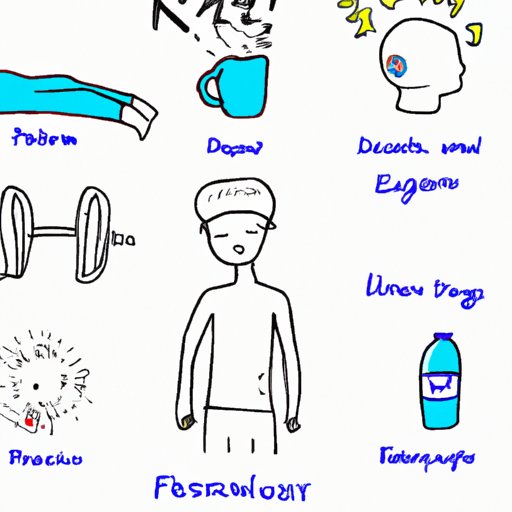Introduction
Do you often feel exhausted and fatigued? If so, you’re not alone. According to the American Academy of Sleep Medicine, 50-70 million Americans suffer from a sleep disorder or chronic sleep deprivation. Fatigue is a common symptom of insufficient or poor-quality sleep, but it can also be caused by lifestyle habits, medical conditions, or other factors.
Get Enough Sleep
The most important factor in avoiding fatigue is getting enough quality sleep each night. Adults typically need seven to eight hours of sleep per night to function optimally. If you find that you’re regularly sleeping less than seven hours, try to make up for lost sleep over the weekend or on days off.
If you’re having difficulty sleeping, there are several things you can do to improve your sleep hygiene. Start by setting a consistent bedtime and wake-up schedule, even on weekends. Avoid caffeine and alcohol late in the day, and limit screen time before bed. You can also create a relaxing nighttime routine to help you wind down before going to sleep.
Exercise Regularly
Physical activity is an important part of keeping your body energized. Exercise increases circulation, which helps to provide your organs and tissues with oxygen and nutrients. Exercise also releases endorphins, which can boost your mood and help you feel more alert and energized.
You don’t have to commit to a strenuous workout every day to reap the benefits of exercise. Aim to get at least 30 minutes of moderate physical activity like walking, jogging, biking, swimming, or dancing each day. If you’re short on time, break up your exercise into smaller chunks throughout the day.
Eat Healthy and Balanced Meals
What we eat has a direct impact on our energy levels. Eating nutrient-rich foods like fruits, vegetables, lean proteins, whole grains, and healthy fats will give you sustained energy throughout the day. On the other hand, processed foods, sugary snacks, and artificially sweetened beverages can lead to spikes and crashes in blood sugar, resulting in feelings of exhaustion.
Start your day off right with a healthy breakfast like oatmeal with fresh fruit and nuts, a smoothie bowl, or a veggie omelet. Throughout the day, snack on energy-boosting foods like yogurt, hummus and veggies, hard-boiled eggs, or nut butter on whole-grain toast. For dinner, focus on lean proteins, complex carbohydrates, and plenty of colorful vegetables.
Manage Stress Levels
Stress can have a significant impact on your energy levels. When you’re stressed, your body releases hormones like cortisol that can leave you feeling drained and overwhelmed. To reduce stress, practice mindful activities like deep breathing, meditation, yoga, or journaling. You can also take breaks throughout the day to recharge and relax.
If you’re feeling particularly overwhelmed, talk to a mental health professional. They can help you identify and manage triggers that lead to stress, as well as teach you strategies to cope with difficult emotions.
Drink Plenty of Water
Staying hydrated is essential for maintaining energy levels. When you become dehydrated, your blood volume decreases, which can lead to fatigue, headaches, and dizziness. The Institute of Medicine recommends that men drink about 15 cups (3.7 liters) of fluids per day, while women should aim for 11 cups (2.7 liters).
Signs of dehydration include thirst, dark yellow urine, dry skin, and fatigue. If you’re feeling tired during the day, reach for a glass of water instead of a cup of coffee. Drinking water can help you stay alert and energized.
Limit Caffeine Intake
Caffeine can be beneficial in small doses, but too much can actually lead to fatigue and exhaustion. The Mayo Clinic suggests limiting caffeine intake to no more than 400 milligrams per day. That’s equivalent to four cups of brewed coffee. If you find that you’re relying on caffeine to get through the day, try replacing coffee with green tea or matcha for a more sustainable source of energy.
Conclusion
Feeling tired all the time can be draining and discouraging. However, with a few simple changes to your lifestyle, you can increase your energy levels and avoid fatigue. Start by getting enough quality sleep each night, exercising regularly, eating healthy meals, managing stress, staying hydrated, and limiting your caffeine intake. By following these tips, you can start to feel more energized and productive.
(Note: Is this article not meeting your expectations? Do you have knowledge or insights to share? Unlock new opportunities and expand your reach by joining our authors team. Click Registration to join us and share your expertise with our readers.)
